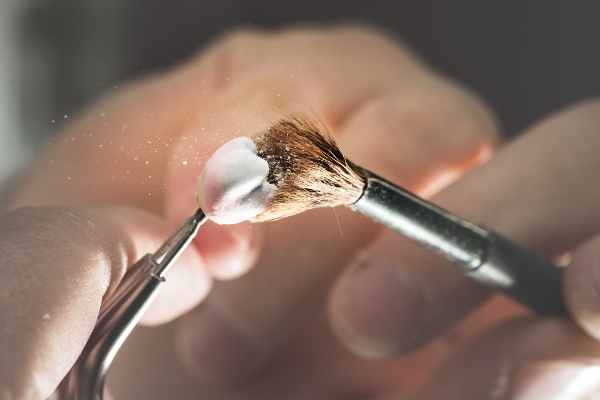Which Dental Restorations a Dentist Might Recommend

Dental restorations offer ways to preserve your teeth and take care of your oral health even when signs of decay begin to occur. A problem might start out as a very small cavity, but if you have not kept up with regular dental appointments and did not notice any pain, it is possible you may need additional work. Learn more about how restorations can help you take care of your teeth and maintain the shape of your mouth.
Common dental restorations
Dental restorations come in a variety of forms, from a basic filling to implanting a crown. A professional can help you determine which choice is appropriate for your situation based on a variety of factors. The majority of general dentists can handle these types of treatments should you need to have repair work done on your smile.
Fillings for cavities
Fillings are the most basic and common type of dental restoration, and something most dentists perform on a daily basis. Before attempting to fill a tooth, the area where the filling takes place is numbed so the patient feels no pain. The tooth is then filled with composite materials such as resin or tooth-colored plastic, or less commonly, silver or amalgams. Once filled, cavities are no longer as noticeable and any prior tooth pain should cease.
A root canal to preserve teeth
A root canal may be necessary if you have a deep cavity that is too close to the root or there is an infection. A root canal allows you to maintain your current smile without pulling the tooth. First, the dentist ensures that any trace of the infected pulp and root is gone. Then, the tooth is cleaned and filled. Many times a crown is necessary to cover up the filling, help hold the tooth in place, or both. Your dentist may place a temporary crown until one that is custom-fitted can be put on.
Implants to avoid gaps
If you had to have an infected tooth extracted or lost one to an accident and now have a gap in your smile, you may be a candidate for dental implants. Implants can ensure your smile looks intact even after removing a tooth that is broken, infected, or no longer worth saving. An implant procedure takes a few visits. If bone grafting needs to be done, this is usually performed when the infected tooth is extracted. After healing, the implant is inserted into the jaw. A second visit to place the abutment might be necessary unless the dentist decides to do both the implant and abutment together. Finally, a tooth-shaped crown is attached to the abutment, providing you with a complete smile.
Crowns or veneers for chipped or cracked teeth
If chronic decay or a sudden injury causes a tooth to chip, crack, or break, it may still be salvageable. In fact, as long as the root is still healthy and enough tooth material remains intact, a dentist may be able to repair the damage with a dental crown or veneer. These tooth coverings are similar in many ways.
Veneers are thin porcelain tooth coverings that are mounted to the front of a damaged or discolored tooth. This treatment is typically reserved for teeth in the front of the mouth and often results in a beautiful yet very realistic finished product. The outer layer of tooth enamel is removed and the veneer is cemented in place, giving the tooth a more even shape and size while also whitening a patient's smile.
Crowns are also tooth coverings, typically made from porcelain, that are used to repair significant damage to a tooth. Rather than removing just the outer enamel layer, a dentist will need to remove much of the tooth material for this procedure, leaving only enough to support a new tooth cap or crown. These tend to withstand more force than veneers and are often used on teeth toward the back of the mouth. They can also be reinforced with metal when necessary to further improve durability.
Conclusion
Having dental restorations done can preserve your oral health, keep your smile looking beautiful, and allow you to maintain self-confidence. If your dentist suggests any of these procedures, there is likely a good reason behind it. Waiting too long can lead to more damage and other unwanted side effects. Take care of your oral health and get the necessary work done as soon as possible.
Request an appointment here: https://www.carolinasmilesdentist.com or call Carolina Smiles Family Dental at (828) 974-3326 for an appointment in our Brevard office.
Check out what others are saying about our dental services on Yelp: Dental Restorations in Brevard, NC.
Recent Posts
Are you in need of dental restoration and don’t know where to turn? You are not alone. Countless patients ask themselves this nagging question daily. We all want to have the most beautiful and bright smile but aren’t sure how to achieve our goal. Fortunately, there are solutions that you can count on. There are many…
A dental restoration helps to improve the appearance and function of teeth that have been damaged due to deformities, decay, or injuries. There are a variety of dental restorations commonly used in dentistry, and some dental issues can be addressed with more than one type of restoration.Let us take a look at some of the…
There are various reasons why a dental restoration may be necessary. A procedure could repair a damaged tooth or replace a missing one. Such treatment will restore your smile and help you enjoy the full use of your mouth once again. If you have lost a permanent tooth, your dentist may recommend an implant or…
Individuals that have weak or damaged teeth might need to have a dental restoration placed. Dental restorations often include crowns, which are popular cap-like pieces that rehabilitate teeth that are in bad shape. A discolored tooth might also benefit from this dental restoration. Keep reading to find out more about what to expect from having…


